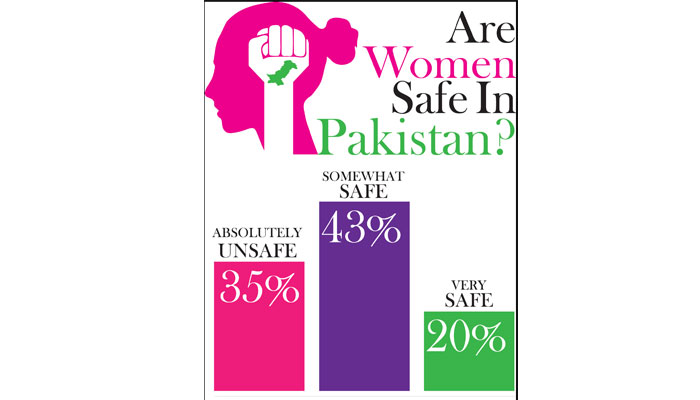Over 80pc Pakistanis think women ‘not safe’ here: survey
ISLAMABAD: More than 80 per cent of Pakistan's population thinks that the country is ‘not safe’ for women gender, according to PULSE perception Quarterly Performance Evaluation Survey (QPES).
The highest percentage of uncertainty regarding women safety came from Khyber-Pakhtunkhwa, followed by Punjab in Pakistan.
Also, only 29pc of women think that they are safe outside the premises of their homes. Interestingly, 22pc of male in society consider females less safe compared to 29pc of female respondents, who felt the same for themselves.
Also, 45pc of males believe their family female members are “Somewhat Safe” and 30pc believe their family’s female members are ‘Unsafe’ outside their homes.
The survey was conducted through CATI (Computer assisted telephonic interviews) a state-of-the-art technology where all calls are recorded.
QPES is Pulse consultant’s indigenous tracking tool – where since November 2018, the public perceptions and opinions about government’s performance and current political situation are collected on a quarterly basis through unbiased, well structured, non-leading questions and instrument.
Below shared findings are based on 1,809 respondents’ opinions, which were interviewed on October 4, 2021.
According to the study, only 20pc of Pakistanis feel that women are ‘Safe’ in Pakistan. Whereas, 43pc believe that women are ‘Somewhat Safe’ – which means their opinion is in between – neither they believe that Pakistani women are ‘Unsafe’ nor they believe that Pakistani women are ‘Safe’.
Thirty-five per cent of Pakistanis believe that Pakistani women are entirely not safe in Pakistan. Highest perception of “Unsafety” was reported from Khyber-Pakhtunkhwa, which was 46pc, and Punjab was the second, reporting 35pc perception of ‘Unsafety’. Also, 19pc respondents in KPK, 21pc in Punjab, 24pc in Sindh and 7pc in Balochistan believed women are “very safe” in the country.
The highest feeling (45%) of “Unsafety” was reported by “Lowest Socio-Economic Class” – threat (Somewhat safe) is mainly reported by respondents belonging to ‘Middle Class’ (57pc and 55pc, respectively).
In addition, the study evaluated that only 29% of the Pakistani females feel that they are ‘Safe’ when they go outside their homes.
However, 35pc of females believe that they are “Somewhat Safe” and similar population (35pc) believes that they are absolutely “Unsafe” when they move in society.
The highest perception of “Unsafety” again reported from KPK (46pc), followed by Punjab (36pc).
Almost half (51pc) of the female respondents from ‘Upper Class’ and one third (38pc) from ‘Lowest Class’ have a concern about safety when commuting outside the home.
Interestingly, males consider females less safe (22pc) in Pakistan compared to female respondents (29pc).
The majority 45pc of males believe that their family female members are “Somewhat Safe” and 30pc believe that their family females’ members are ‘Unsafe’ outside the home.
Highest perception of “Unsafety” was reported from KPK (45pc), followed by Punjab (30pc).
Interestingly, contrary to females belonging to ‘Upper Class’ (Where 51pc believe that they are unsafe), almost one-third of males belong to the same class have the opinion that their female family members are safe (36pc) and only one fourth (25pc) have the opinion that female family members are ‘Unsafe’.
At 95pc confidence level, on bipolar answers – for the sample of 1,809 respondents – study’s error of margin is just ± 2.20%.
In the study, very delicate stratified sampling process was adopted, where along with rural areas- more than 60 cities were covered from all provinces and cultural diversity of Pakistan. Results of the study were reweighted on the actual population of provincial urban and rural basis.
-
 Columbia University Sacks Staff Over Epstein Partner's ‘backdoor’ Admission
Columbia University Sacks Staff Over Epstein Partner's ‘backdoor’ Admission -
 Ozzy Osbourne's Family Struggles Behind Closed Doors
Ozzy Osbourne's Family Struggles Behind Closed Doors -
 Dua Lipa Claims Long-distance Relationship 'never Stops Being Hard'
Dua Lipa Claims Long-distance Relationship 'never Stops Being Hard' -
 BTS Moments Of Taylor Swift's 'Opalite' Music Video Unvieled: See Photos
BTS Moments Of Taylor Swift's 'Opalite' Music Video Unvieled: See Photos -
 Robin Windsor's Death: Kate Beckinsale Says It Was Preventable Tragedy
Robin Windsor's Death: Kate Beckinsale Says It Was Preventable Tragedy -
 Rachel Zoe Shares Update On Her Divorce From Rodger Berman
Rachel Zoe Shares Update On Her Divorce From Rodger Berman -
 Kim Kardashian Officially Takes Major Step In Romance With New Boyfriend Lewis Hamilton
Kim Kardashian Officially Takes Major Step In Romance With New Boyfriend Lewis Hamilton -
 YouTube Tests Limiting ‘All’ Notifications For Inactive Channel Subscribers
YouTube Tests Limiting ‘All’ Notifications For Inactive Channel Subscribers -
 'Isolated And Humiliated' Andrew Sparks New Fears At Palace
'Isolated And Humiliated' Andrew Sparks New Fears At Palace -
 Google Tests Refreshed Live Updates UI Ahead Of Android 17
Google Tests Refreshed Live Updates UI Ahead Of Android 17 -
 Ohio Daycare Worker 'stole $150k In Payroll Scam', Nearly Bankrupting Nursery
Ohio Daycare Worker 'stole $150k In Payroll Scam', Nearly Bankrupting Nursery -
 Michelle Yeoh Gets Honest About 'struggle' Of Asian Representation In Hollywood
Michelle Yeoh Gets Honest About 'struggle' Of Asian Representation In Hollywood -
 Slovak Fugitive Caught At Milano-Cortina Olympics To Watch Hockey
Slovak Fugitive Caught At Milano-Cortina Olympics To Watch Hockey -
 King Charles Receives Exciting News About Reunion With Archie, Lilibet
King Charles Receives Exciting News About Reunion With Archie, Lilibet -
 Nvidia Expands AI Infrastructure With Nevada Data Centre Lease
Nvidia Expands AI Infrastructure With Nevada Data Centre Lease -
 Royal Family Shares Princess Anne's Photos From Winter Olympics 2026
Royal Family Shares Princess Anne's Photos From Winter Olympics 2026




